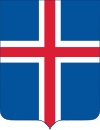Lofsöngur
"Lofsöngur" (Icelandic pronunciation: [ˈlɔfsœiŋkʏr̥], lit. "Hymn"[1]), also known as "Ó Guð vors lands" (pronounced [ouː ˈkvʏð ˈvɔrs ˈlants]; English: "O, God of Our Land"), is the national anthem of Iceland. Sveinbjörn Sveinbjörnsson composed the music, while the lyrics were authored by Matthías Jochumsson. This was adopted as the national anthem in 1944, when the country voted to end its personal union with Denmark and become a republic.
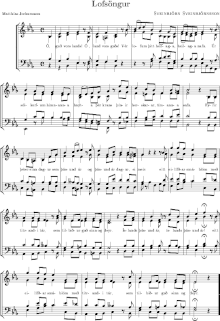 | |
National anthem of | |
| Also known as | "Ó Guð vors lands" (English: "O, God of Our Land") |
|---|---|
| Lyrics | Matthías Jochumsson, 1874 |
| Music | Sveinbjörn Sveinbjörnsson, 1874 |
| Adopted | 1944; 76 years ago |
| Audio sample | |
"Lofsöngur" (Instrumental)
| |
It is notorious for being extremely challenging to sing and its strong religious theme has been the source of dispute in contemporary Iceland.
History
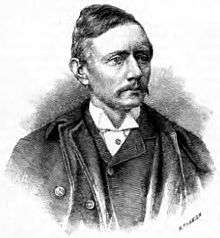
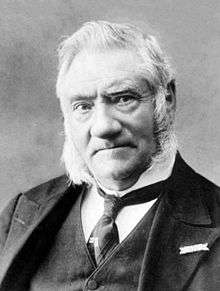
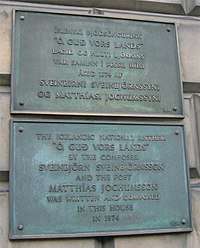
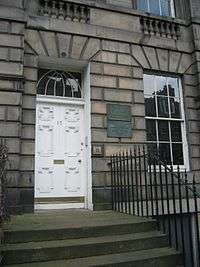
The period during the late 1800s saw music in Iceland develop and flourish. Though many of their initial composers had to study and apply their trade abroad due to insufficient opportunities on offer at home, they were able to bring what they had learned back to Iceland.[2][3] One of these musicians was Sveinbjörn Sveinbjörnsson, who was the first person from his homeland to pursue "an international career as a composer".[2] He sojourned in Edinburgh during the early 1870s,[3][4] and wrote the music for Lofsöngur inside a town house located in the city's New Town in 1874.[3] By 1922, the song became so well known and loved throughout Iceland that, in recognition of this, the Althing endowed Sveinbjörnsson with a state pension.[3] He was the first composer in the country to be conferred such an honour.[2]
The lyrical portion of it was penned by Matthías Jochumsson, one of the "best loved poets" in the country[5] who was also a priest.[6] Although the commemorative plaque in Edinburgh purports that both the music and lyrics were written there, it is nowadays believed that Jochumsson had in fact produced the latter back in his homeland.[3] Much like Sveinbjörnsson, Jochumsson became the first Icelandic poet to be given a state pension. The Althing also bestowed on him the title of "National Poet".[7]
It was written to coincide with the 1874 festivities in honor of one millennium since the Norse first arrived on the island.[6][8] It is for this reason that the full translation of the anthem's title is "The Millennial Hymn of Iceland".[8][9] The song was first played on August 2 of that year,[9] at a service celebrated at Reykjavík Cathedral to commemorate the milestone, with the King of Denmark (and hence, the King of Iceland) – Christian IX – in attendance.[6][10] However, the song was not officially adopted as the country's national anthem until 70 years later in 1944,[11] when Icelanders voted in a referendum to end their state's personal union with Denmark and become a republic.[12]
Criticism
Although the Icelandic national anthem consists of three stanzas, only the first one is sung on a regular basis.[10] It is notorious for being extremely challenging to sing, due to its large vocal range of high and low registers—spanning a minor fourteenth.[3][10][13][14] "Lofsöngur" has been described as a Christian hymn to God with strong religious themes.[6][10] Thus, its suitability as the national anthem in Iceland's increasingly secular society of the present-day has been challenged,[3][10] notwithstanding the fact that the country still maintains an official religion in the form of the Church of Iceland.[6] Some have suggested replacing it with a non-religious song that is more all-encompassing.[6][10]
Lyrics
| Icelandic original[15] | Phonetic transcription (IPA) | English translation by Jakobina Johnson | |
|---|---|---|---|
| First stanza | |||
|
Ó, guð vors lands! Ó, lands vors guð! |
[ouː | kvʏːð vɔr̥s lans ‖ ouː | lans vɔr̥s kvʏːð ‖] [vjɛːr lɔːvʏm θɪht heiːlaɣa | heiːlaɣa napn̥ ‖] [uːr souːlcʰɛrvʏm hɪmnana n̥iːtʰaðjɛːr kʰrans] [fiːrɪr θjɛr ɛːr eitn̥ taːɣʏr sɛm θuːsʏnt auːr̥] [eiht eiːlivðar smauploum mɛð tʰɪːtrantɪ tʰauːr̥ |] [sɛm tʰɪːlpɪðʏr kvʏːð sɪnː ɔɣ teiːr̥ ‖] [istlans θuːsʏnt auːr̥ |] [eiht eiːlivðar smauploum mɛð tʰɪːtrantɪ tʰauːr̥ |] [sɛːm tʰɪlpɪðʏr kvʏːð sɪnː ɔɣ teiːr̥ ‖] |
Our country's God! Our country's God! | |
| Second stanza | |||
|
Ó guð, ó guð! Vér föllum fram |
[ou kvʏːð ou kvʏːð vjɛːr fœtlʏm fram] [kvʏːð faːðɪr | vɔːr trɔʰtɪn frau cɪːnɪ tʰɪl cɪns |] [ɔɣ vjɛːr kʰvœːkʏm vɔr̥t hɛlkasta mauːl̥ ‖] [θviː θuː ɛr̥t vɔr̥t eiːnasta scouːl̥ ‖] [θviː θuː tʰɪlpjoust vɔr̥t fɔrlaɣaçouːl̥ ‖] [istlans θuːsʏnt auːr̥ ‖] [sɛm hɪhtna vɪð sciːnantɪ souːl̥ ‖] |
Our God, our God, we bow to Thee, | |
| Third stanza | |||
|
Ó, guð vors lands! Ó, lands vors guð! |
[ouː | kvʏːð vɔr̥s lans ‖ ouː | lans vɔr̥s kvʏːð ‖] [vjɛːr lɪːvʏm sɛm plaxtantɪ | plaxtantɪ strauː ‖] [vjɛːr teiːjʏm | ɛv θuː ɛr̥t eiː ljouːs θaːðɔɣ liːf |] [sɛmað lɪftɪr ɔsː dʏftɪnʏ frauː ‖] [vɔːr leiðtɔiːjiˑ taːɣana θrœyːt] [istlans θuːsʏnt auːr̥ ‖] [sɛm θrɔskast au kvʏːðricɪs prœyːt ‖] |
Our country’s God! Our country’s God! | |
References
- Sverri Hólmarsson, ed. (2007). Icelandic-English Dictionary.
lofsöngur = hymn, song of praise
- Rule, James Casey (2011). "Writing Lilja: A Glance at Icelandic Music and Spirit". Perspectives on Business and Economics. Lehigh University. 29: 126.
- McCall, Chris (June 27, 2016). "Iceland's national anthem was written in an Edinburgh house". The Scotsman. Edinburgh. Archived from the original on August 18, 2016. Retrieved April 25, 2017.
- "Composer of the Week – Iceland, A Symphony of Fire and Ice". BBC Radio 3. BBC. December 2012. Retrieved April 25, 2017.
- Mather, Victoria (May 27, 2016). "Iceland has a very special kind of beauty and you don't always have to look up to see it". Iceland Magazine. Archived from the original on April 26, 2017. Retrieved April 26, 2017.
- Silk, Mark (July 1, 2016). "Go Iceland!". The Gazette. Colorado Springs. Religion News Service. Archived from the original on April 25, 2017. Retrieved April 26, 2017.
- Scott Fortune, Andrew (November 16, 2014). "Matthías Jochumsson, poet and writer of Iceland's national anthem". Icelandic Times. Archived from the original on April 26, 2017. Retrieved April 27, 2017.
- Neijmann, Daisy L., ed. (2006). A History of Icelandic Literature. University of Nebraska Press. p. 278.
- Florby, Gunilla; Shackleton, Mark; Suhonen, Katri, eds. (2009). Canada: Images of a Post/National Society. Peter Lang. p. 242.
- Hauptmann, Katharina (January 12, 2011). "The Un-Singable National Anthem of Iceland". Iceland Review. Archived from the original on April 25, 2017. Retrieved April 26, 2017.
- "Iceland". The World Factbook. CIA. January 12, 2017. Retrieved April 26, 2017.
- "Iceland – History". Worldmark Encyclopedia of Nations (12th ed.). Thomson Gale. 2007. Retrieved April 26, 2017.
- Taylor, Lesley Ciarula (March 4, 2010). "Things you never knew about national anthems". Toronto Star. Archived from the original on April 26, 2017. Retrieved April 27, 2017.
- Erlingsdottir, Iris (July 18, 2009). "Iceland Independence Day: We Worship Our God (Mammon) And Die". Huffpost. Retrieved June 1, 2020.
- Jochumsson, Matthías (1815). Ljóðmæli: úrval. Bókaverzlun Sigf. Eymundssonar.
